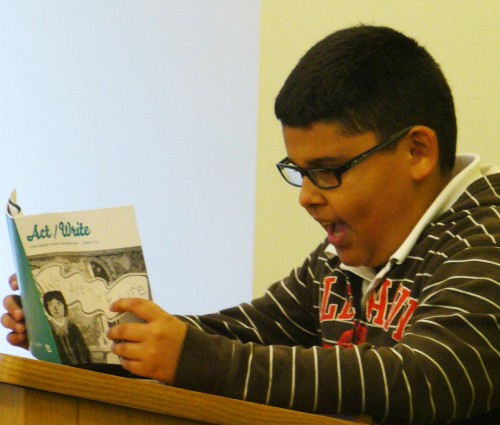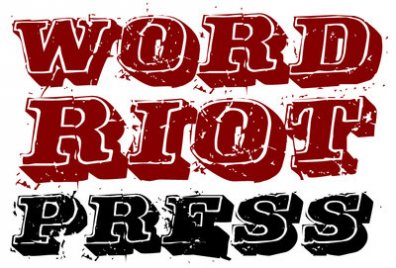Teaching Fiction Writing, Pt. 1

A student from the Act/Write teaching outreach program reads his story at the book release. Photo from the Free Street Theater site.
I came to grad school seeking opportunities to teach. I figured that my professorial career would start with a section of Freshman Comp, where I’d drag my butt into the classroom at 8:30am to try to convince hungover dorm kids that fulfillment and fun could be found in essay-writing. That wasn’t how it went down. Here’s a summary of the teaching that I’ve done through the Fiction Writing department.It started in my second year, with the class Tutor Training.
In Tutor Training, we learned the basics of teaching the Story Workshop method and applied our new found knowledge to running one-on-one sessions with undergrad students. We each had three tutees (that word still makes me laugh, because it sounds like potty humor), who we taught on a weekly basis. Every week, we’d write about our experiences, poring over every little thing that happened while tutoring. In Tutor Training class, we’d discuss challenges and triumphs, try new writing exercises, and learn more about the pedagogy.
Learning about the pedagogy was particularly interesting because not a lot is explained in the average Fiction Writing workshop, and I often found myself wondering about the things that went on in class.
I should also add that we were paid to tutor, and after taxes, I was making about $100 a week. That’s a lot of tacos and Old Forester!
To enroll in Tutor Training, your workshop teacher has to recommend you. So, make it clear to your Fiction 2 professor that you’re interested in the class, and ask them to give you any pointers throughout the semester. If you want to continue tutoring after taking Tutor Training, you are required to either audit five sessions of a Tutor Training class or enroll in Classroom Teaching.
The next semester, I was in Classroom Teaching.
Classroom Teaching is the logical continuation of Tutor Training, where we learned how to apply what we’d learned as tutors to a larger class…of grade school kids. My co-teacher Morgan and I taught a class of fourth graders in Blue Island, a Metra-accessible south suburb. It was fun because our students were at an age where they appreciated the chance to be creative, but they weren’t yet adolescents who were too cool to participate.
Also, there are things that can be done with a class that can’t be done with one tutee, so I got to teach more exercises, plus story forms that I’d first tried as a writer a couple of semesters before. An added bonus was getting some practice with classroom management (AKA “crowd control”).
While I was in Classroom Teaching, I was also doing Teaching Outreach Work.
The Fiction Writing department collaborates with the CCAP (Center for Community Arts Partnership) office at Columbia College Chicago to run a couple of teaching outreach programs. I was involved in the program Act/Write, which works in conjunction with a nonprofit called Free Street Theater. My Tutor Training teacher Devon Polderman suggested that I get involved.
In Act/Write, student teachers and interns from the Fiction Writing department and a teaching artist from Free Street go into a public school to run a special workshop that melds Story Workshop with theater. Since some Story Workshop teachings and exercises have things in common with improv theater games, the two go well together. On a typical day, the Free Street teacher (what’s up, D-Nick!) would start the class with theater warm-ups that lead into a highly interactive Story Workshop session, taught by the Columbia folks.
The Act/Write classes lasted for a little longer than the spring semester. My first year, in 2010, I was an Act/Write intern in two middle school classes in North Lawndale on the West Side. In 2011, I was lead teacher for a grade school class in Wicker Park on the North Side. I found it to be fun, exasperating, rewarding, frustrating, tiring and fulfilling. My experiences in Act/Write deserve a post of their own, so I’ll just say that middle school kids are, by nature, hormonal, and that underfunded inner city schools are not always prepared to support a writing program. The catch is that public schools often repress creativity in young people who are itching to express themselves, so the aforementioned drawbacks are what make the program so valuable. I wonder what the positive results would have been if we had had a similar program at the city high schools that I went to in the ’90s.

Word Riot is a great online journal.
WEEK LINKS:
Since a big part of choosing an MFA program is getting a feel for the writing that it produces, I’m sharing a new link to Fiction Writing grad student work every week. Here’s “The Auctioneers” by Jessie Morrison. Jessie and I started during the same year, and she’s been setting the bar high the whole time, except for when she got me to drink this coffee-flavored Patron crap last New Year’s. That was not a good look. Anyway, I remember her working on “The Auctioneers” in our nonfiction-centric Proseforms class with Germania Solorzano, and it’s cool to see it on the great site Word Riot. It’s about John Dillinger!
